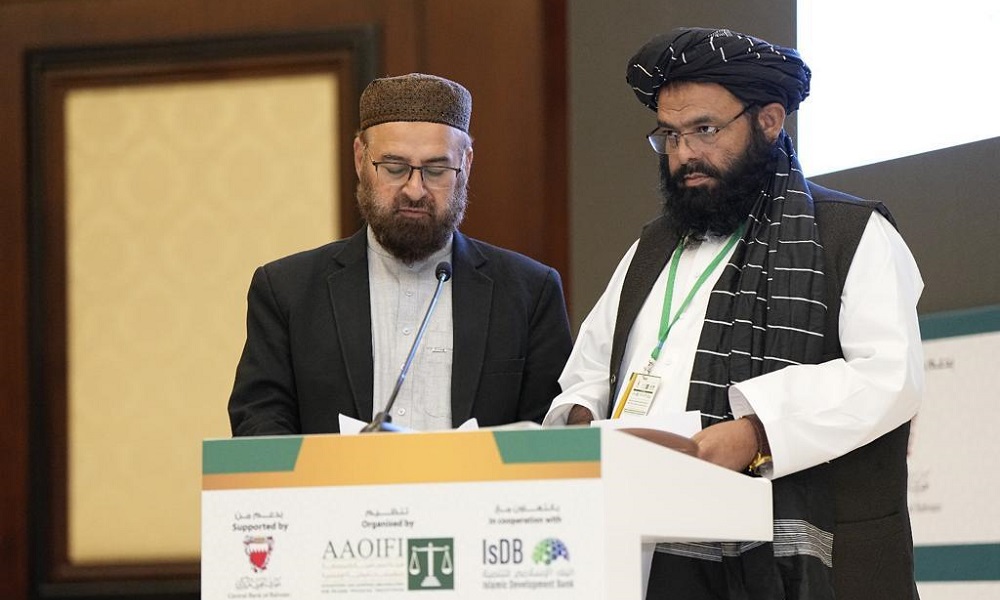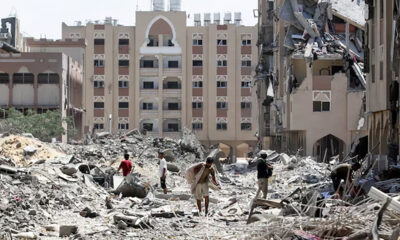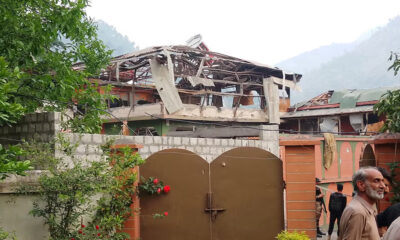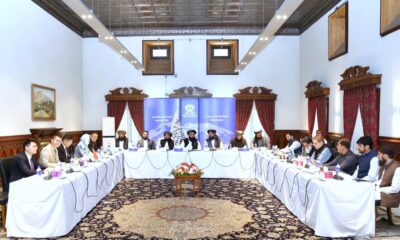Business
IEA Islamizing Afghanistan’s banking system

A delegation chaired by Hedayatullah Badri, acting governor of Da Afghanistan Bank, participated in a two-day conference titled “Strategies for the Impending Economic Slowdown and a Post Oil World: Through Economic Diversification and Leveraging Islamic Finance” on November 29 and 30 in Bahrain, DAB said in a statement.
At the conference, Badri said that DAB is committed to fully Islamizing Afghanistan’s banking and financial sector to eliminate interest and other illicit practices. Presently, all forms of interest-based transactions are prohibited, and all conventional banks will be converted into Islamic banks, read the statement.
In addition, he stated that diligent efforts are being made to make the banking and financial sectors in Afghanistan interest free.
These efforts involve drawing upon the experiences of other Islamic countries as well as leveraging the expertise and knowledge of international Islamic institutions.
Furthermore, Badri elaborated on the importance of ensuring that financial products offered by Islamic banking adhere to Sharia standards not only superficially in terms of their form, but also fundamentally in terms of their types.
He underscored the significance of conducting banking and finance activities in areas that yield benefits for the people and contribute to the realization of Sharia goals.
He further stated that particular attention and funding should be directed towards projects that generate job opportunities, alleviate poverty, ensure socio-economic justice, and enhance environmental protection.
On the sidelines of this meeting, Badri met with several international financial institutions, central bank governors from Islamic countries, and diplomats. Additionally, he had a dedicated meeting with Shaikh Ebrahim Bin Khalifa Al Khalifa, Chairman of the AAOIFI Board of Trustees, focusing on Islamic banking and fostering bilateral relations. He also met with the Turkish ambassador in Bahrain and shared insights on banking and economic matters.
He also conducted meetings with the board of directors of Islamic banks, religious scholars, and members of Sharia committees associated with Islamic banks. In these meetings, he provided detailed briefings on the implementation of Islamic banking in Afghanistan under Sharia principles, as well as the monetary policy formulated by Da Afghanistan Bank.
During another segment of the meeting, the Acting Governor of Da Afghanistan Bank engaged in a discussion with the representative of the Ulema (religious scholars) of Bangladesh. The focus of their conversation revolved around the banking and economic situation in Afghanistan, with special emphasis on the factors contributing to the stability of the Afghani currency. The representative of the Ulema of Bangladesh expressed that the Ulema and people of Bangladesh are proud that the Afghani is regarded as the most stable currency in Asia.
Business
Chinese company keen to invest $50 million in automobile industry in Afghanistan

Chinese automobile company Dongfeng has expressed an interest to invest $50 million in Afghanistan.
A representative of the company said in a meeting with Ahmadullah Zahid, Deputy Minister of Industry and Commerce, that the company wants to invest $50 million in the automobile manufacturing sector in Afghanistan in four phases over a period of three and a half years.
He added that with this investment, 2,000 vehicles will be manufactured per year.
Welcoming the company’s interest in investing in the country Ahmadullah Zahid, the Deputy Minister of Industry and Commerce, described Afghanistan as one of the safe and secure places for investment with favorable profits.
He assured the Chinese that all domestic and foreign investors will be treated equally and will be fully supported.
In the meeting, the representative of Dongfeng also emphasized that the company’s investment in Afghanistan will create jobs for 500 to 700 people in the country.
He said that the company’s products will include cars, trucks, ambulances, and buses.
Business
Kyrgyzstan exports 25 million liters of petrol to Afghanistan in 2 months
The gasoline, worth $11.5 million, was exported to Afghanistan during January and February this year

Kyrgyzstan has in two months exported 24.9 million liters of gasoline to Afghanistan, the Kyrgyz National Statistics Committee said Monday.
According to local media, the gasoline, worth $11.5 million, was exported during January and February this year.
Exports of gasoline to Afghanistan have been steadily rising over the past two years.
In the first six months of last year, 700 liters went to Afghanistan, against just 19 liters in the same period in 2023.
Overall trade between the two countries also saw a steady increase after the Kyrgyz government removed the Islamic Emirate of Afghanistan (IEA) from their list of banned organizations in September last year.
Afghanistan is now the main consumer of Kyrgyz motor gasoline, accounting for about 92 percent of all exports of this fuel.
While Afghanistan has its own oil and gas reserves, particularly in the Amu Darya basin, it relies heavily on imports, especially from Central Asian countries and Iran, to meet its energy needs.
Business
Trump says buying Iranian oil must stop, threatens secondary sanctions on purchasers

U.S. President Donald Trump said all purchases of Iranian oil or petrochemical products must stop and any country or person buying any from the country would be immediately subject to secondary sanctions.
“They will not be allowed to do business with the United States of America in any way, shape, or form,” he wrote on Truth Social on Thursday, Reuters reported.
Trump’s comments follow the postponement of the latest U.S. talks with Iran over its nuclear program, which had been due to take place in Rome on Saturday. A senior Iranian official told Reuters a new date will be set “depending on the U.S. approach.”
Trump’s administration has targeted Tehran with a series of sanctions on entities including a China-based crude oil storage terminal and an independent refiner it has accused of being involved in illicit trade in oil and petrochemicals.
In February Trump restored a “maximum pressure" campaign on Iran which includes efforts to drive its oil exports to zero and help prevent Tehran from developing a nuclear weapon.
Secondary sanctions are those where one country seeks to punish a second country for trading with a third by barring access to its own market, a particularly powerful tool for the United States because of the size of its economy.
Analysts have said that to really crack down on Iran’s oil exports the U.S. would have to impose secondary sanctions on entities such as Chinese banks that facilitate the purchases of Iranian oil. China is the largest buyer of Iranian crude.
-

 Regional5 days ago
Regional5 days agoIran’s foreign minister urges restraint in India, Pakistan standoff
-

 Latest News5 days ago
Latest News5 days agoCabinet Meeting convened to discuss Afghanistan’s population census plan
-

 International Sports5 days ago
International Sports5 days agoIPL 2025: Seven teams fighting for four spots
-

 World5 days ago
World5 days agoIsrael may seize all Gaza in expanded operation, officials say
-

 Regional4 days ago
Regional4 days agoAt least 26 civilians killed in Indian strikes on Pakistan: Islamabad
-

 Regional4 days ago
Regional4 days agoIndia strikes Pakistan over Kashmir tourist killings
-

 Science & Technology4 days ago
Science & Technology4 days agoSkype ends operations after 22 years of service
-

 Latest News4 days ago
Latest News4 days agoIslamic Emirate of Afghanistan ‘concerned’ over rising tensions between Pakistan and India






















